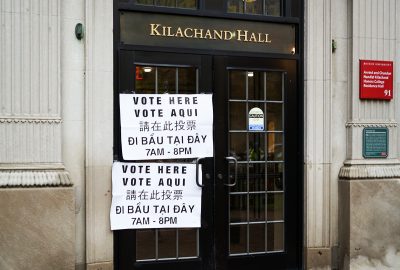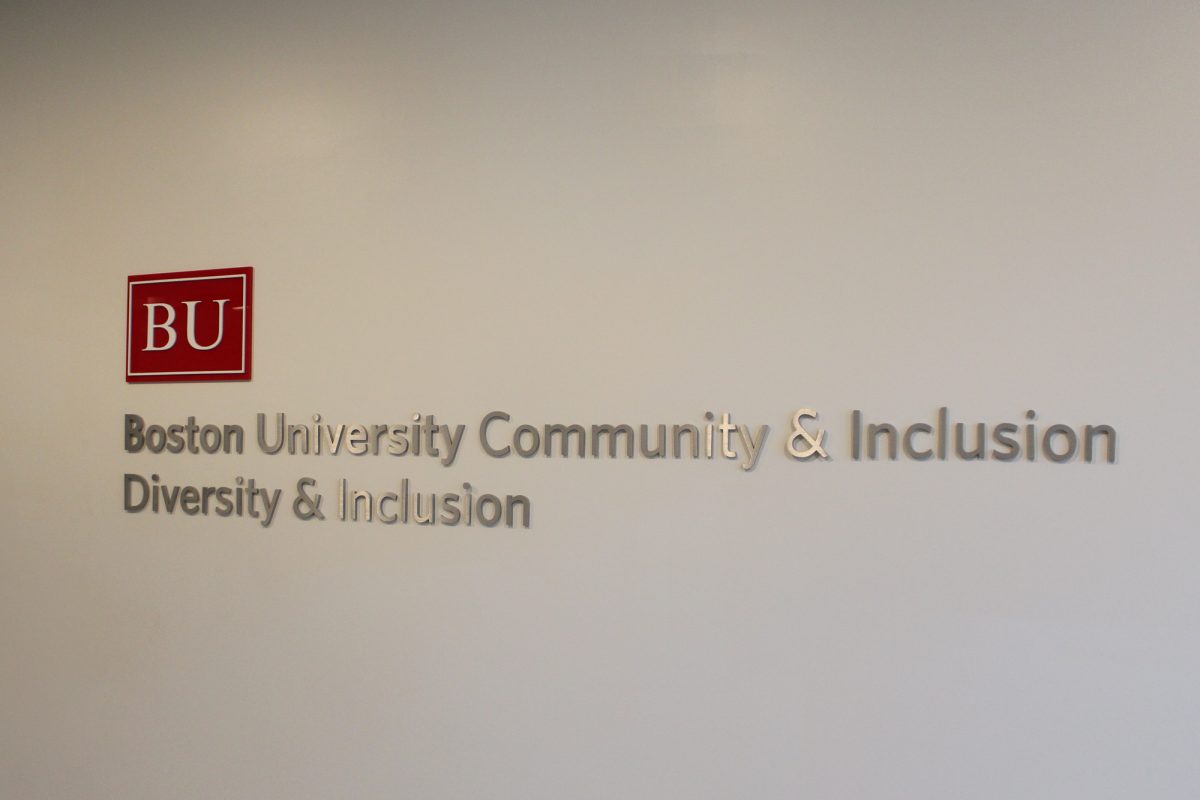Professors and students in the College of General Studies have partnered with the Dean of Students Office to launch BU Votes, an initiative to increase voter registration among Boston University students.
BU Votes is a campus-wide effort that holds events with multiple undergraduate colleges across campus as well as BU Residence Life, with tabling events scheduled for the coming weeks in several classroom and residential buildings.

The tabling events will continue until Feb. 4, and the Massachusetts deadline to register to vote in the March presidential primaries is 8:00 p.m. on Feb. 12. BU Votes will resume tabling in September in preparation for the presidential election.
Susan Lee, associate chair and master lecturer of social sciences in CGS, created BU Votes with fellow CGS professors Shawn Lynch and Daniela Melo. While the organization has just now begun their work with students, the group came together in October 2019, Lee wrote in an email.
Lee wrote that she was inspired to create BU Votes after the positive reception she received when she and a handful of other professors set up voter registration tables in the lobby of the CGS building in both 2016 and 2018.
“Students said ‘Gee, this is great, how come they aren’t doing this in my college?’ because we have a lot of people come through the doors here to class who aren’t CGS students,” Lee said. “That kind of put the idea in our head that this should be happening in other places in the university too, and not just CGS.”
Some of the tabling events in the undergraduate colleges are organized by those colleges’ student governments, including Questrom School of Business Student Government and Sargent College of Health and Rehabilitation Sciences Student Government. BU Votes also incorporates student participation through student interns, such as CGS sophomore Ting Wei Li.
Li said his interest in politics and the electoral process led him to get involved with BU Votes, where he works primarily on web design, research and campus outreach. He said he hopes to encourage his peers to vote in order to make changes that impact them as young people.
“Turnout is abysmally low amongst young people,” Li said. “If we want our voices to be heard about issues that pertain to us, such as student loans and debt, it is only natural that we should encourage our peers to go vote.”
Li said he sees a spectrum of political involvement among students on BU’s campus and thus hopes that BU Votes will help more students get active by making political participation more accessible.
“People might vote if you give them the chance to register to vote,” Li said. “For BU Votes, we’re there to make things easier, for you to become registered to vote so you can get through the first hurdle, and all you need to do is show up at the ballot box.”
Only 46 percent of eligible voters aged 18-29 voted in the 2016 presidential election, rivaling nearly 71 percent of voters aged 65 and over, according to the BU Votes website. Lee said this low turnout among young voters will lead politicians to neglect the issues pertaining to young people.
“Politicians are going to respond to who’s voting,” Lee said. “Social security is going to be safe, but how about student loans, the price of housing, the cost of education and things that young people might be interested in? They aren’t as much of an issue because young people aren’t voting in the big blocs that older people are voting in.”
Federal law requires universities to facilitate student voter registration to some capacity, Lee said. However, this requirement can be met by merely sending an email reminder to the student body.
Lee said she believes colleges have a unique opportunity to encourage patterns of political participation among young people.
“I would like to see universities push [political involvement] among their student bodies,” Lee said, “and then hopefully when people graduate they would say, ‘Okay, this is part of being an educated person, you take part in the political life of your community.’ A democracy is strong when citizens participate.”
In addition to their current and upcoming tabling events, BU Votes provides resources that help students with the mailing processes involved in voter registration, something Lee said turns many students away from the registration process.
“It’s the 21st century, people don’t use mail like they used to,” said Lee. “And so it’s a little bit of a barrier to register to vote, you still have to send something in by mail.”
Unless students have a driver’s license on file in Massachusetts, they are unable to register online to vote in Massachusetts and must send in a paper form. To help with this process, BU Votes and the Dean of Students Office have partnered with TurboVote, a website that facilitates voter registration, to send students their registration forms in a pre-stamped envelope. TurboVote will also send absentee ballots for students who want to vote in their home states.
Isabella Castro, a sophomore in the College of Arts and Sciences, said she is registered to vote and finds issue with the lack of young people who cast their vote.
“I know that a lot of the younger generation doesn’t [register], and even if they register they don’t go out to the polls a lot of the time,” Castro said. “I think it’s something that’s definitely an issue and I’m glad [BU Votes] is working on this.”
Cameron Andrews, a sophomore in the College of Communication, said he thinks initiatives like BU Votes are a positive step in increasing young voter turnout.
“I definitely think more people need to be registered to vote, and I think having more initiatives to help college students to do it can’t hurt,” Andrews said. “I think in general more college students need to vote.”
Cameran Schwarz, a junior in COM, said she appreciates BU Votes’ efforts to make registration less challenging and more available to students.
“I am registered to vote, and I think it’s really good that they have an avenue to help students do that,” said Schwarz. “Especially if you’re away from home, it can be kind of challenging to know where to go.”
Giorgio Zaghen, a senior in CAS, said he thinks encouraging students to register and vote is important, regardless of how politically active they may be otherwise.
“I think it is important,” Zaghen said, “not necessarily to try to force people to become activists, but just to get people to vote.”
Professor Lee said she also hopes to continue BU Votes’ involvement on campus throughout the year through a lecture series focused on elections and civic involvement. The official BU Votes calendar with tabling events and lectures can be found here.















































































































